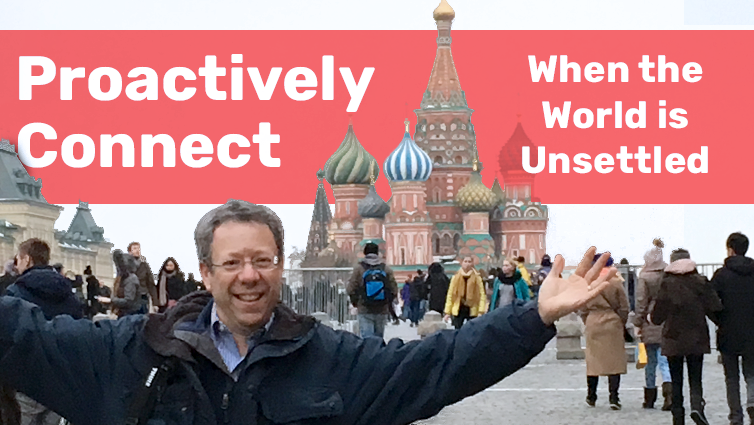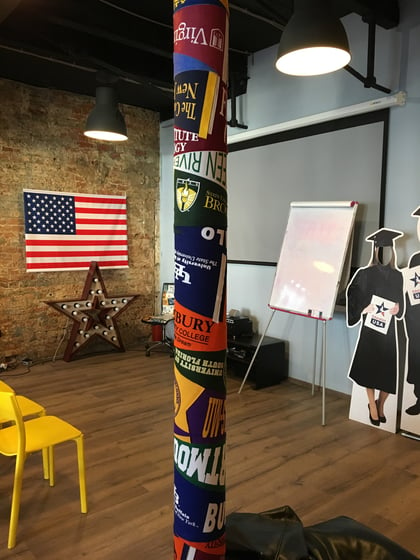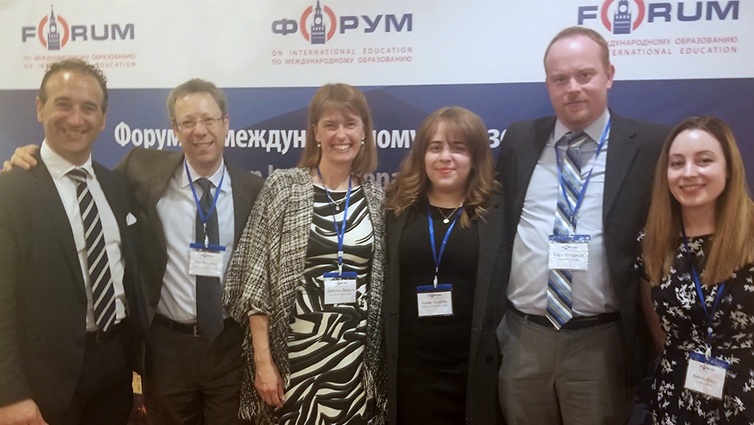
Maybe it's the jet lag (it's not) but this most recent international jaunt has left me thinking big and getting a bit sentimental about the field we are in. You know all those cynics who refer to the international student recruiting work we all do with disdain saying, “It’s really only about the tuition dollars the international students pay?” Perhaps you can send them a link to this post and shift their thinking just a bit.
Last week I was in Moscow presenting on global digital marketing at The Forum on International Education. It was an honor to be invited to play a role in this effort by the Russian Ministry of Education as the government there implements an audacious plan to grow from about 230K international students to more than 700K choosing Russia for their post-secondary education. No small task.
At a time when the American and Russian heads of state are spitting at each other, I found myself in Moscow learning from my colleagues from around the world and taking time to visit many of Russia’s iconic and moving cultural achievements. Each evening, back in my hotel room, CNN told me about how our world leaders were acting in ways that left me more determined than ever.
Read on for reflections on the value of your work and the one important thing you can do right now in the face of international turbulence.
Waxing Philosophical
Really it has to do with the state of our international connections at every level, from heads of state to international student interns.
The biggest insight reinforced by this trip was inspired by a presentation from Donna Hayes Regional Director, University of Southampton in the UK. Sparked by the current drama between the US, UK and Russia, she recalled the importance of her connections and recruitment travel to Turkey just a short time ago as that country went through severe turbulence with terrorism and an attempted coup.
Donna talked about the colleagues she has at Turkish institutions and the students she often connects with. She talked passionately about how her travel there during the turbulence, her efforts to connect, provided much needed reassurance and stability to those who were understandably unsettled. Her work and outreach strengthened important cross-cultural connections.
As the leaders of various countries continue to make decisions that drive us all farther apart, it becomes increasingly important that the rest of us seek ways to move toward each other.
Sharing and evaluating each other’s ideas, this is what the education industry is actually all about. These activities foster human progress. From food production and water management to structural engineering and artificial intelligence, our work drives human progress. This has been true since the dawn of time and more recently (say, roughly 1,000 years ago) with the launch of the first “official” universities -- thank you Morocco, Italy and England.
Education is critical to bringing us together and bringing harmony to the world. And before we get all sentimental about how wonderful it would be if the world held hands and sang songs together (which would be nice), this has everything to do with the very practical notion of finding useful things for all of us to do each day. Things that keep us busy and feeling motivated to contribute to our general surroundings. Pretty basic stuff really.
When human beings are feeling productive and able to meet their personal needs, they are far less inclined to go about ruining things for their neighbors. Cultural and economic ties create shared opportunities for something intrinsically valuable to all of us: peace.
And when times are such that we are able to rise above the basics, those cross-cultural connections bring joy and wonder. When turmoil surrounds us the basics may be as far as we can go (think Maslov). And we can prioritize higher goals as politics, economics and time permit.
Concrete Recommendations – What You REALY Can Do In Times Like These
In practical terms, this means we connect, proactively and frequently.
While in Moscow, beyond meeting my fellow conference attendees and holding a few other outside meetings, I visited the Vladimir Potanin Foundation to learn more about their fantastic efforts to support Russian education. And I made the effort to locate Moscow’s Education USA office (not easy to find this one) and meet with the staff there. A great team working hard to share your information with the Russian community. And a very fun office environment in an artsy section of Moscow. Totally worth the effort.

With this trip I can now count among my Russian friends and colleagues Alexander Abashkin, Vice-Rector of The Moscow School of Social and Economic Sciences; Liliya Vorontsova, Vice-rector for Economic Affairs and Strategic Development, Kazan Innovative University; Sergey Ushakovsky, International Programs Marketing, European University at St. Petersburg; and of course, the conference organizer Alexander Ruchkin, Director of the Grint Center for Education.

From left: Santiago Garcia, Dean, Director of Recruitment, Grenoble Graduate School of Business; Ben Waxman, CEO, Intead; Daniela Locreille, Director, International Education & Career Counseling; Anais Escobar, International Recruiter, Center for International Programs, Colorado State University - Pueblo; Karl Anderson, Assistant Director for International Student Recruitment, University of Arkansas - Fayetteville; Katerina Kantis, Student Recruitment Officer, Communications and External Relations, University of Essex.
There were many more from around the world who connected in Moscow. While our various countries’ diplomatic representatives were feeling strained, we were sharing innovative strategies to strengthen our cross-cultural connections and send students across the globe.
We are all responsible for this world. It is incumbent on us — specifically those of us in the field of international education — to take the long view and make the effort. We are, in fact, the bedrock of civilization’s advancement. May sound a bit grandiose, and yet...there is hard truth there.
Academic partnerships at all levels — institutional, collegial, student-to-student — all play a significant role in drawing the world closer together and advancing our shared journey. Do you have a colleague in China? Russia? Venezuela? Haiti? Chad? Syria? Turkey? When was the last time you tried to connect?
Make the effort. We are all counting on you.

